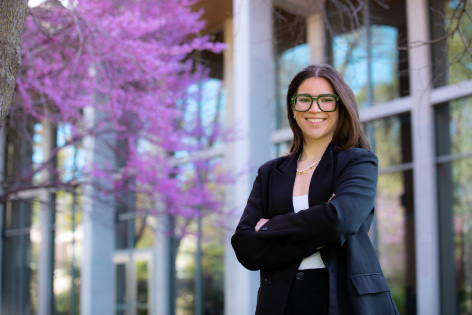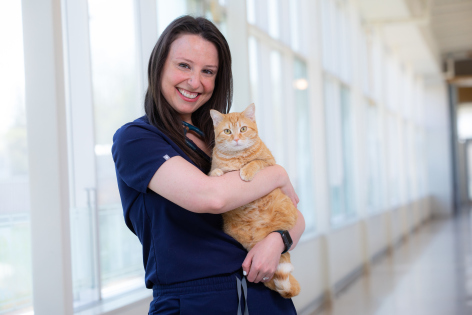AMES, Iowa – Nothing can stop Amanda Zoe Hernandez Rodriguez, it seems.
At just 22 years old, she’s survived hurricanes, earthquakes and a pandemic. And she’s come through each cataclysm a little more resilient than before. Those challenges taught her the importance of community service, and now, as she finishes her degree from Iowa State University this week, Hernandez Rodriguez has set her sights on returning to her native Puerto Rico and building a bright future in one of the business world’s most critical fields.
“I’ve seen a lot of things at a young age that I shouldn’t have,” Hernandez Rodriguez said when recalling the natural disasters that struck Puerto Rico in recent years and the COVID-19 pandemic. “My mother tells me I lived so much at 16 or 17. That helped me push forward and believe in myself, in a sense, because I want to be somebody and make a change.”
When disasters strike
In September 2017, when Hernandez Rodriguez was 16, Hurricane Maria devastated Puerto Rico, washing away entire neighborhoods, crippling the island’s electrical grid and leaving nearly 3,000 people dead in its wake. Hernandez Rodriguez remembers the disaster as a turning point in her life, a period of time that shaped her outlook during the years to come.
She counts herself lucky since her home in Caguas, a city near the island’s Central Mountain Range, wasn’t destroyed in the storm. She was without power for months, but her electricity was restored much sooner than that of many Puerto Ricans because of her home’s proximity to a hospital. Power wasn’t fully restored to some parts of the island for about 11 months after the hurricane.
Hernandez Rodriguez remembers touring the island after the storm and feeling overwhelmed by despair as she took in the full scope of the destruction. But she drew inspiration from the strength and spirit of her neighbors. She started volunteering with her schoolmates to clean up neighborhoods and help rebuild.
“Puerto Ricans are resilient and happy people,” she said. “We find a way to just live with what we have and make the best of what’s happening. My neighbors went outside and helped clean the streets. Everybody united.”
But disaster struck again before the island could fully recover.
Puerto Rico lies at the boundary of two tectonic plates in the Caribbean, making the region vulnerable to earthquakes. A major quake struck Puerto Rico in January 2020, once again crippling the island’s electrical infrastructure and causing serious damage to some regions. Hernandez Rodriguez, a student at Iowa State at the time, was visiting her home during winter break when the quake struck. She remembers thinking that it felt like a wicked one-two punch with Hurricane Maria still so fresh in her memory.
She decided that wherever her path led, she wanted to be able to give back to Puerto Rico.
“I want to help my island when stuff like this happens,” she said. “I want to give back to my island because I was born there and everything I know is from there.”
Finding her passion during the pandemic
As her high school graduation approached, Hernandez Rodriguez knew she wanted to go to college in the United States. She applied to nine schools and learned about Iowa State when one of her high school teachers mentioned their son had become a Cyclone. Hernandez Rodriguez wanted to study business, but she hadn’t decided on a specialization. The breadth of courses and majors offered in the Ivy College of Business reassured her that she could find the right program at Iowa State, so she moved to Ames without ever having been to Iowa before.
She went through some growing pains that first semester as she took on the academic challenges of college in a setting where English is spoken far more commonly than Spanish, her first language. But she felt like she was hitting her stride by the start of her second year at Iowa State – only for the COVID-19 pandemic to upend her academic plans.
The pandemic forced Hernandez Rodriguez to return to Puerto Rico during the spring semester of 2020, just days after her nineteenth birthday, when all coursework at Iowa State shifted to virtual instruction. She expected the change to last a few weeks at the most, but as the pandemic wore on, she found she wasn’t getting as much as she wanted from her classes.
“I didn’t want to sit on a computer and watch the screen,” she said. “I tried, but it was still hard.”
She considered quitting school, but the resilience she learned from her fellow Puerto Ricans as they dealt with the aftermath of Hurricane Maria and the earthquake inspired her to keep going. Rather than viewing the pandemic as an obstacle that could derail her education, she decided to think of it as a growth opportunity.
“This is just a stepping stone in the progress of who I’m going to become,” she said. “This is just another step that’s going to take me where I want to go.”
The pandemic disrupted supply chains across the globe, making many previously common goods difficult to find. Suddenly, supply chains and logistics became critical concerns not just for those in the business world but for consumers everywhere. And the more Hernandez Rodriguez learned about supply chains, the more convinced she became that she’d found her calling.
She enrolled in Iowa State’s supply chain management major, with a finance minor, and that’s the degree she’ll receive at the conclusion of this semester. She’ll put that degree to use when she goes to work for Collins Aerospace as a global supplier development analyst, working with global suppliers to anticipate and prepare for potential supply chain disruptions. She’ll be able to work from Puerto Rico, allowing her to stay connected to her home and help with disaster recovery.
“Thanks to COVID, I found my major,” she said. “All those shortages that were happening, all of that was because of supply chains. I started understanding, and I completely fell in love with the field. Supply chain is everything.”
She called attending Iowa State University one of the best decisions she’s ever made. She credited the support she received from her professors and university staff as a major ingredient for her success.
“I want to inspire other Latinas to come to Iowa State and study business because the opportunities here are amazing,” she said. “The atmosphere, the faculty, they really work with you.”
Contacts
Amanda Zoe Hernandez Rodriguez, Supply Chain Management, azhr@iastate.edu
Fred Love, News Service, 515-294-0704, fredlove@iastate.edu
Quick look
Amanda Zoe Hernandez Rodriguez has survived hurricanes, earthquakes and a pandemic, and she’s learned to view those cataclysmic events as growth opportunities. After earning a degree in supply chain management from Iowa State, she’s set her sights on a bright future in her home of Puerto Rico.
Quote
“This is just a stepping stone in the progress of who I’m going to become. This is just another step that’s going to take me where I want to go.”
Amanda Zoe Hernandez Rodriguez, graduating senior in supply chain management

Spring 2023 graduate Amanda Zoe Hernandez Rodriguez. The supply chain management major from Puerto Rico has survived devastating hurricanes and earthquakes, and those experiences gave her a sense of resilience and dedication to helping others. Photo by Christopher Gannon. Larger image.
Jassma'Ray's story
Jassma'Ray Johnson came to Iowa State to study psychology because she loves to help people. She never expected that she'd start her own beauty products business out of her Friley Hall dorm room. As she gets ready to graduate, Johnson is excited to spend more time growing her company.
Maia's story
No one would have blamed Maia Farber had she taken a leave of absence from her veterinary coursework after she was diagnosed with thyroid cancer in 2021, but she was determined to pursue her dream of becoming a small-animal surgeon. At the conclusion of this semester, that dream will come true. Read Maia's story.
